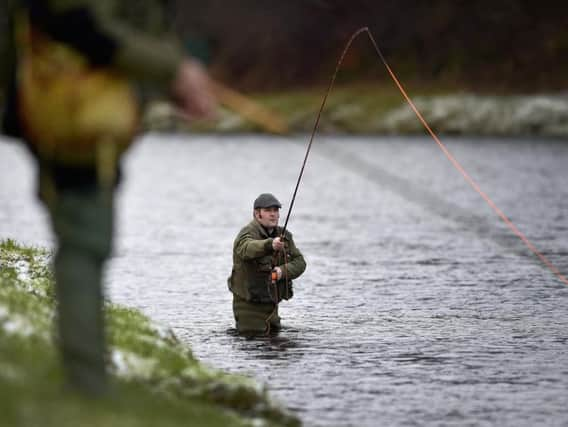Anglers in Scotland to be banned from taking their catch home as salmon stocks reach 'crisis point'


Figures for the 2020 season show 103 of Scotland's 173 salmon rivers are classed as Category 3 this year, compared to 95 last year.
It means almost 60 per cent of salmon rivers are now classed as Category 3 - meaning stocks are low and making a catch and release policy mandatory within their waters.
Advertisement
Hide AdAdvertisement
Hide AdTen rivers or waterways have moved to the highest conservation status since last year, amid ongoing concerns over the survival of the species.
Some angling clubs say their memberships are declining because of the inability to kill and take home salmon.
Critics also questioned the methodology used to grade rivers, insisting it fails to provide a true reflection of stocks.
Fisheries experts previously called for salmon conservation to be treated as a national priority as the species approaches "crisis point".
Andrew Graham-Stewart, director of Salmon and Trout Scotland, said fish farms have the biggest impact.
He said: "Whilst Scottish Government acknowledges that wild salmon numbers are in severe decline, their response generally amounts to little more than lip service.
"In the West Highlands and islands, the main pressure is the impact of sea lice from salmon farms, infesting juvenile wild salmon with fatal consequences.
"The total absence of regulation to protect wild salmon from the impacts of salmon farming was clearly highlighted by the Scottish Parliament's inquiry into the industry in 2018.
Advertisement
Hide AdAdvertisement
Hide Ad"Over a year later, the Scottish Government has done nothing whatsoever to remedy this glaring omission."
Conservation regulations introduced in 2016 sort salmon rivers into three categories, with 1 indicating fishing is sustainable and 3 meaning salmon numbers are low.
Meanwhile, 35 rivers now fall within Category 2, meaning "management action is necessary to reduce exploitation".
A further 35 are classed as Category 1, where no additional action required.
The number of rivers in Category 3 rose this year but is still lower than the 122 recorded in 2018.
Holyrood's Environment, Climate Change and Land Reform Committee is due to discuss the changes today (Tue).
An impact assessment says "a number of angling clubs have concerns about a reported decline in the renewal of club memberships because of the inability to kill a salmon".
A spokesman for the Scottish Gamekeepers Association's fishing group said the "picture is of overall decline, which is worrying" for conservation and the viability of wild fisheries.
Advertisement
Hide AdAdvertisement
Hide AdHe said: "Game angling supports 4,300 full-time equivalent jobs in the kind of remote communities which can rely heavily on them as a means of keeping families in local areas.
"The methodology which is used to grade rivers has been refined over time but some individual rivers will still feel the process undermines them.
"For example, rod catch is part of the grading assessment.
"So, if less people are fishing a river because it has been classified below Category 1, the rod catch may continue to decline and the river may fall further down the rankings.
"It could be argued that this is not a true reflection of the total picture.
"That said, there are clear signals in this assessment and Scottish Government needs to give salmon the attention it deserves whilst listening more to the people working on the front line every day."
A Scottish Government spokeswoman said the decline in the numbers of wild salmon returning to Scottish rivers "is of great concern and we are determined to safeguard the future of this important species".
She said ongoing work will contribute to the development of a wild salmon strategy by September.